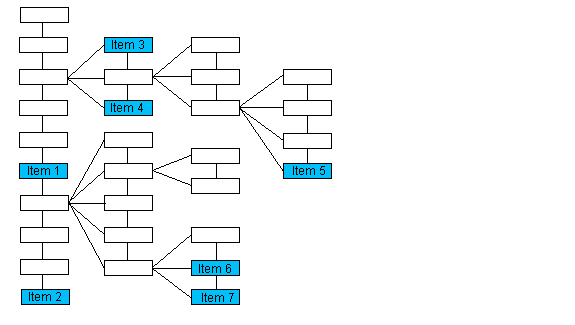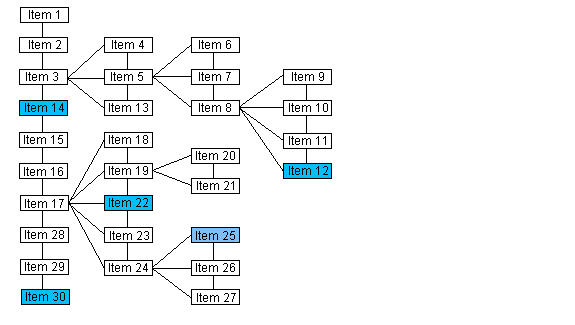
LDicomIOD::GetLast
#include "Ltdic.h"
static pDICOMIOD LDicomIOD::GetLast(pIOD, bTree)
|
pDICOMIOD pIOD; |
/* pointer to a DICOMIOD structure */ |
|
L_BOOL bTree; |
/* flag that indicates how to evaluate the IOD Structure */ |
Returns a pointer to the last item in the IOD Structure.
|
Parameter |
Description | |
|
pIOD |
Pointer to a DICOMIOD structure within the IOD Structure. A pointer to the DICOMIOD structure that contains the last item in the IOD Structure will be returned. | |
|
bTree |
Flag that indicates how the IOD Structure will be evaluated. Possible values are: | |
|
|
Value |
Meaning |
|
|
TRUE |
Evaluate the IOD Structure as a tree. |
|
|
FALSE |
Evaluate the IOD Structure as a list. |
Returns
|
!NULL |
A pointer to a DICOMIOD structure that contains the last item in the IOD Structure. |
|
NULL |
The IOD Structure is empty. |
Comments
If the IOD Structure is evaluated as a tree structure, this function returns the last item on the same level as pIOD with the same parent as pIOD. Please note that the numbering of the items in this illustration is arbitrary and does not imply order.

|
If the passed pointer points to : |
The function returns a pointer to : |
|
Item 1 |
Item 2 |
|
Item 3 |
Item 4 |
|
Item 5 |
Item 5 |
|
Item 6 |
Item 7 |
|
NULL |
Item 2 |
If the IOD Structure is evaluated as a list, the last item in the list is returned. Please note that the numbering of the items in this illustration does indicate the order of the items when the IOD Structure is evaluated as a list.

|
If the passed pointer points to : |
The function returns a pointer to : |
|
NULL |
Item 30 |
|
Item 12 |
Item 30 |
|
Item 14 |
Item 30 |
|
Item 22 |
Item 30 |
|
Item 25 |
Item 30 |
The following functions will also help you navigate the IOD Structure as either a tree or a list:
If you evaluate the IOD Structure as a tree, you can also use the following functions to navigate the tree:
Required DLLs and Libraries
|
LTDIC For a listing of the exact DLLs and Libraries needed, based on the toolkit version, refer to Files To Be Included With Your Application |
See Also
|
Functions: |
LDicomIOD::GetFirst, LDicomIOD::GetPrev, LDicomIOD::GetNext, LDicomIOD::GetCountModule, LDicomIOD::GetRoot, LDicomIOD::GetParent, LDicomIOD::GetChild |
|
Topics: |
Example
This example displays the name of the last item in the current level.
L_INT LDicomIOD_GetLastExample_1()
{
pDICOMIOD pElement;
pDICOMIOD pLast;
pElement = LDicomIOD::Find(NULL, TAG_PATIENT_NAME, IOD_TYPE_ELEMENT, FALSE);
if (pElement != NULL)
{
pLast = LDicomIOD::GetLast(pElement, TRUE);
::MessageBox(NULL, pLast->pszName, TEXT("Notice"), MB_OK);
}
return DICOM_SUCCESS;
}
/* This example displays the name of the last item in the IOD table */
L_INT LDicomIOD_GetLastExample_2()
{
pDICOMIOD pLast;
pLast = LDicomIOD::GetLast(NULL, FALSE);
if (pLast != NULL)
{
::MessageBox(NULL, pLast->pszName, TEXT("Notice"), MB_OK);
}
return DICOM_SUCCESS;
}